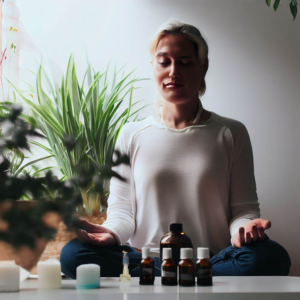Do you often find yourself feeling overwhelmed and stressed out? You’re not alone. According to the American Psychological Association, 77% of Americans experience physical symptoms caused by stress on a regular basis.
While there are many pharmaceutical options available for stress relief, some people prefer natural remedies that can provide similar benefits without unwanted side effects.
One popular theory is that hypnosis can be an effective tool for stress relief. While some may be skeptical of this approach, studies have shown that hypnosis can help reduce anxiety and improve overall well-being.
Additionally, herbal supplements such as chamomile and valerian root have been used for centuries to promote relaxation and calmness. Aromatherapy with essential oils like lavender and peppermint has also gained popularity as a natural way to relieve stress.
With so many options available, it’s worth exploring natural remedies for stress relief to see what works best for you.
Hypnosis for Stress Relief
 You’re in for a treat with this section, as we’ll be delving into the world of hypnosis and how it can help you unwind and relax.
You’re in for a treat with this section, as we’ll be delving into the world of hypnosis and how it can help you unwind and relax.
Hypnosis is a state of deep relaxation that allows your mind to become more receptive to positive suggestions. It can help you manage stress by promoting feelings of calmness and reducing anxiety levels.
Hypnosis has been found to be an effective tool for stress relief, with studies showing that it can significantly reduce stress levels in individuals who undergo hypnotherapy sessions. The benefits of hypnosis are numerous, including improved sleep quality, reduced muscle tension, and enhanced cognitive function.
Additionally, hypnosis helps people develop coping mechanisms to deal with stressful situations better. Finding a qualified hypnotherapist is essential if you want to experience the full benefits of hypnosis. Ensure that the practitioner is certified by a reputable organization and has adequate training and experience.
Schedule an initial consultation with the therapist before committing to any sessions so that you can discuss your needs and expectations from the therapy. With the right guidance from a skilled professional, hypnosis can provide immense relief from stress and promote overall well-being without any side effects.
Remember that there’s no one-size-fits-all when it comes to managing stress effectively. What works for one person may not work for another, so it’s important to explore different options until you find what works best for you personally.
Hypnosis is just one natural remedy among many others like herbal supplements or aromatherapy – try them out until you discover your perfect fit!
Herbal Supplements for Calming Effects
You’ll be feeling as cool as a cucumber after trying out these herbal supplements for some much-needed zen.
Herbal teas and adaptogenic herbs have been used for centuries to help reduce stress and anxiety levels. The calming effects of certain herbs can help soothe your nerves and promote relaxation.
One popular adaptogenic herb is ashwagandha, which has been shown to reduce cortisol levels in the body, the hormone that’s released during times of stress. You can find this herb in supplement form or add it to your daily routine by drinking ashwagandha tea.
Another great option is chamomile, which has a mild sedative effect and is often used to promote relaxation before bed.
In addition to these adaptogenic herbs, there are also other natural supplements that may help with stress relief such as valerian root, passionflower, and kava kava.
It’s important to note that not all supplements work the same way for everyone and it’s best to talk with your healthcare provider before adding any new supplement to your routine.
With a little bit of research, you can find the right herbal supplement that works best for you in achieving a calm state of mind.
Aromatherapy with Essential Oils
If you’re looking for a fragrant and relaxing way to unwind, essential oils are a great option. Essential oil blends have been used for centuries to promote relaxation, reduce stress, and improve mood.
Aromatherapy diffusers can be used to spread the scent of essential oils throughout your home or office. Here are three popular essential oils that can help relieve stress:
1. Lavender: Known for its calming properties, lavender is one of the most common essential oils used in aromatherapy. It has a soothing scent that can help ease anxiety and promote relaxation.
2. Bergamot: This citrusy oil has a refreshing scent that is often used in perfumes and colognes. It’s also known for its stress-reducing properties and can help improve mood.
3. Ylang-ylang: This floral-scented oil is often used in massage therapy due to its relaxing properties. It’s believed to help lower blood pressure and reduce feelings of anxiety.
Using essential oils for aromatherapy is an easy way to incorporate natural remedies into your daily routine. Simply add a few drops of your chosen oil into an aromatherapy diffuser or mix it with carrier oil for topical use.
With their pleasant scents and proven benefits, essential oils are an excellent tool for combating stress and promoting relaxation without relying on pharmaceuticals or other synthetic treatments. Remember that everyone responds differently to different types of aromatherapy, so it may take some experimentation to find the perfect blend or method for you.
Whether you prefer floral notes or citrusy scents, there’s an essential oil out there that can help you relax and de-stress naturally. So why not give it a try? Your mind (and body) will thank you!
Mindfulness and Meditation Techniques
Looking for a way to improve your mental wellbeing and increase focus? Try incorporating mindfulness and meditation techniques into your daily routine.
Breathing exercises are one of the most basic forms of mindfulness practice. It involves focusing on the breath, while paying attention to each inhale and exhale. By doing so, you become more aware of your body’s sensations, which can help reduce stress and anxiety.
Body scan meditation techniques are also effective in reducing stress levels. They involve lying down or sitting comfortably, then systematically scanning through different parts of the body to release tension and promote relaxation. This technique promotes self-awareness by allowing you to focus on how each part feels as it is being scanned.
Incorporating mindfulness practices into your daily routine can help reduce stress levels significantly. Start small by setting aside 10-15 minutes every day for breathing exercises or body scan meditations. With regular practice, you’ll find that these techniques become easier to do, and you’ll start experiencing their benefits sooner than later!
Lifestyle Changes for Long-Term Stress Management
One effective way to manage stress in the long-term is by making lifestyle changes, like prioritizing regular exercise and maintaining a balanced diet. Exercise isn’t only beneficial for physical health but also for mental health. It triggers the release of endorphins, which are natural mood-boosters that can help reduce feelings of anxiety and depression. You don’t have to spend hours at the gym; even 30 minutes of moderate-intensity exercise per day can make a significant difference.
Another lifestyle change that can help with stress management is getting enough sleep. When you’re well-rested, you’re better equipped to handle stressful situations and less likely to feel overwhelmed or irritable. Aim for seven to nine hours of sleep per night, and try to establish a consistent bedtime routine to promote relaxation before bed.
Finally, it’s important to take breaks throughout the day and engage in relaxing activities like reading or spending time with friends and family. This can help prevent burnout and allow you to recharge so that you’re better able to handle whatever comes your way.
Remember, managing stress is about finding what works best for you – experiment with different strategies until you find what helps you feel calm and centered.
How does stress affect the body’s immune system?
Stress can have a significant impact on your immune system, making you more susceptible to illness and disease. When you’re stressed, your body releases cortisol, which can suppress the immune response that fights infections and diseases.
This means that if you’re constantly feeling stressed, your body may not be able to fight off illnesses as effectively. Fortunately, there are many coping mechanisms for stress management that can help boost your immunity and reduce the negative effects of stress on your body.
From exercise and meditation to proper nutrition and sleep hygiene, finding healthy ways to manage stress is crucial for maintaining optimal health and wellbeing.
Can stress lead to hair loss?
Stress can lead to hair loss by triggering a hormonal response in your body that disrupts the natural growth cycle of your hair.
However, there are natural remedies for baldness that can help prevent further hair loss and promote regrowth. One effective method is scalp massage, which increases blood flow to the hair follicles and stimulates growth.
Another option is incorporating essential oils like lavender or rosemary into your routine, as they’ve been shown to improve overall hair health. Additionally, maintaining a healthy diet rich in vitamins and minerals such as biotin and iron can also aid in preventing further hair loss.
Consider implementing these natural remedies for baldness into your daily routine and consult with a healthcare professional if you continue to experience excessive hair loss.
Is it safe to combine different natural remedies for stress relief?
You know what they say, “too much of a good thing can be bad.” And when it comes to natural remedy interactions for holistic stress management, this saying couldn’t be more true.
While combining different natural remedies may seem like a great idea to combat stress from all angles, it’s important to remember that not all combinations are safe. Certain herbs and supplements can interact with each other or with prescription medications you may be taking, leading to unwanted side effects.
It’s always best to consult with a healthcare practitioner before mixing and matching different remedies, as they can help guide you in creating an effective and safe stress relief plan.
Are there any potential side effects of using hypnosis for stress relief?
Hypnosis has been found to be an effective tool for stress relief, as it helps individuals to achieve a relaxed state of mind and body. However, it’s important to note that there may be potential drawbacks associated with its use.
Some people may experience unintended side effects such as dizziness, headache, or nausea after undergoing hypnosis sessions but – on the rare occasions they occur – they will vanish fast. Additionally, the effectiveness of hypnosis varies from person to person and may not work for everyone seeking stress relief.
It’s recommended that you consult with a professional before beginning any hypnosis therapy in order to assess whether it’s the right choice for your unique situation.
How long does it take for herbal supplements to start working for stress relief?
When it comes to stress relief, herbal supplements can be an effective option. Unlike prescription medications, which can have side effects and take time to work, herbal supplements are often gentler on the body and can provide relief more quickly.
However, the effectiveness of herbal supplements may vary depending on the individual and the specific supplement being used. It’s important to do your research and talk to a healthcare professional before starting any new supplement regimen.
While natural remedies like herbal supplements can certainly help with stress relief, it’s important to remember that they should be used in conjunction with other healthy lifestyle habits such as exercise, proper nutrition, and adequate sleep for optimal results.
Congratulations on taking the first step towards a stress-free life! By considering natural remedies for stress relief, you’re choosing to prioritize your mental and physical well-being.
Hypnosis can help you access the power of your subconscious mind to alleviate anxiety. Herbal supplements like chamomile and valerian root can provide calming effects without harsh side effects. Aromatherapy with essential oils is another effective way to soothe your senses and promote relaxation.
Incorporating mindfulness and meditation techniques into your daily routine can also help reduce stress levels in the long run. Remember that lifestyle changes such as regular exercise, a healthy diet, and quality sleep play an important role in managing stress too.
By implementing these natural remedies, you have the power to combat stress and live your best life possible!





